The role of battery management software in maximizing the efficiency of renewable energy systems
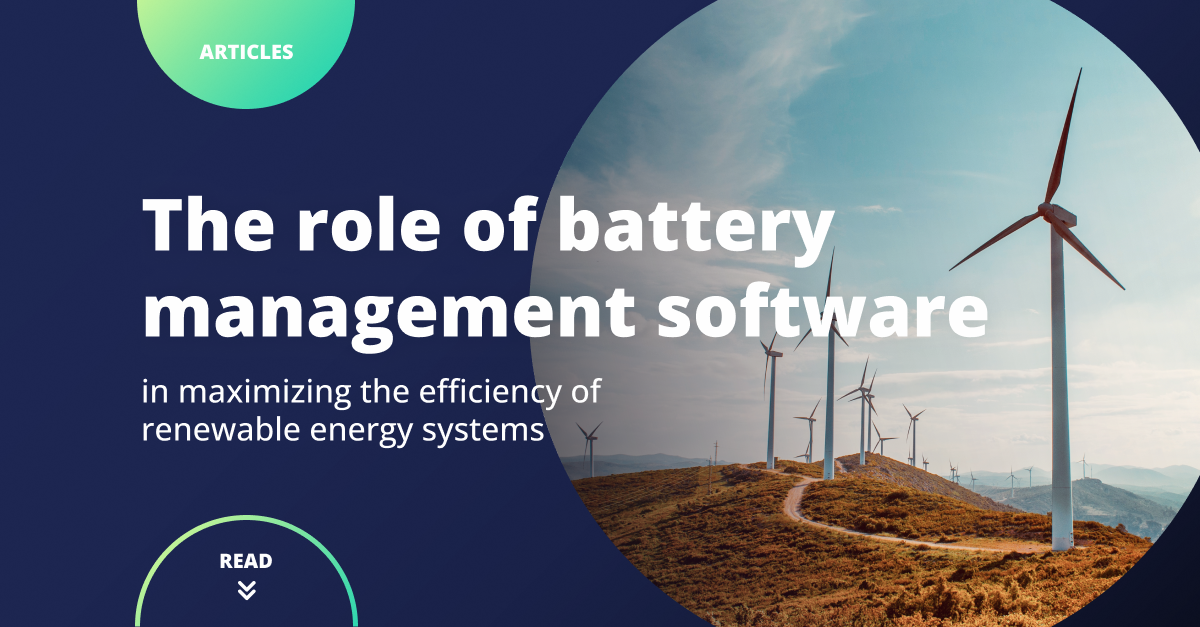
Using renewable resources such as wind or solar power to power business equipment or machines has become a popular option for businesses. Intel US and EU factories, for example, draw 100% of the power they need from wind, solar photovoltaic, hydro, and biomass farms. Companies such as Apple, Google, Microsoft, and Adobe have also turned to renewable energy.
What makes many companies still wary of renewable power though is that the amount of generated energy can vary wildly depending on the weather conditions. Using a battery pack to store the extra energy would be the best solution here, but if you need several, then managing the entire battery infrastructure could be quite taxing.
Then, how about using battery management software to keep an eye on your energy supplies and optimize the performance of renewable energy plants?
Sounds interesting? Read on, and we’ll tell you everything you need to know about how a battery management system works and what are its best benefits.
What is a battery management system?
Battery management systems (or BMS in short) are solutions for battery monitoring, management, optimization, and protection. Through various sensors inside the system, the BMS can monitor the charge capacity, cell voltage, current, and temperature of the battery cells and then send the information to the central platform.
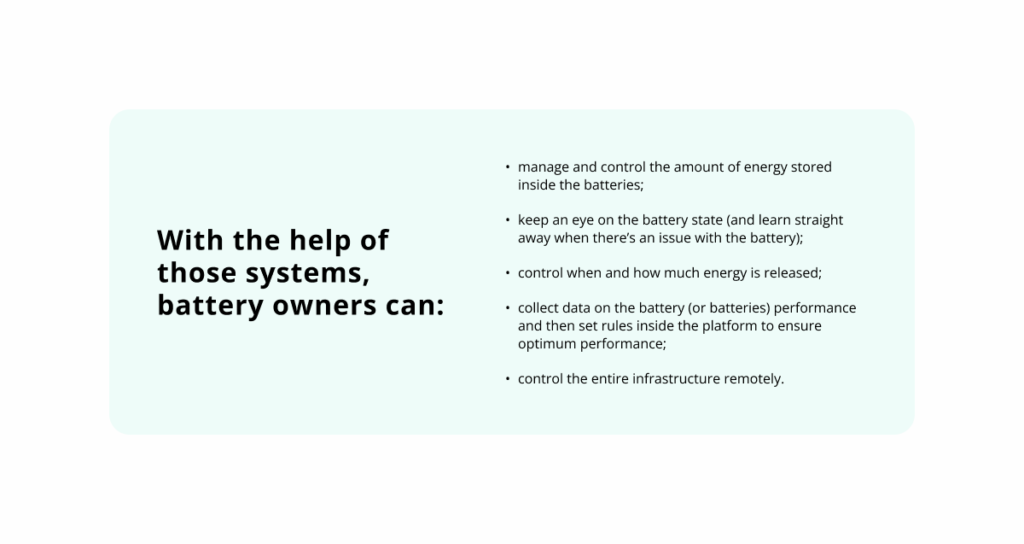
That way, battery owners don’t need to monitor how each storage device works separately. Instead, they can add as many batteries to the platform as they need and then control all of them from a single dashboard.
A second significant benefit of those tools is that businesses can use them to schedule when the batteries should be charged and when the power inside them should be released.
For example, they can set inside the platform that the stored energy should be released during peak demand times (when the energy costs are the highest). Or when the amount of energy generated from renewable energy plants significantly drops. Businesses can also release stored energy on demand if they need it.
Why using battery management systems is so important?
Unlike coal or oil, which are pretty consistent when it comes to the amount of energy generated, renewable resources are, unfortunately, quite unpredictable. During sunny or windy days, solar panels or wind turbines might generate far more power than a company needs at the moment. However, once the sun gets covered by clouds or the wind stops blowing, the energy generation will immediately drop though.
That makes having a storage method for storing excess renewable energy pretty much a must if a company wants to take full advantage of renewable energy generators’ powers.
For this task, using batteries is currently the most popular choice (though there are a couple of other options as well, as we mentioned in our article about available storage methods). As battery prices keep falling, they are now one of the most affordable ways for companies to store surplus renewable energy for later.
The battery can be filled when there’s more than enough energy coming from the renewable plants, and then the power can be stored for as long as needed. Then, the energy can be released whenever the company needs it – for example, during cloudy days.

Those batteries also work exceptionally well as a backup energy source during power outages. As both the regular energy grid and the renewable energy plants are not working then, using the stored energy could ensure the company can work as usual.
To store enough energy for their needs though, businesses might need more than
one battery set – especially if they want to run mostly on renewable energy. The more storage devices they have on-site though, the harder it becomes to manage all of them. And that increases the risk that the storage owners might overlook some issues that can later lead to the battery malfunction or break down – and costly repairs or replacement.
With several renewable plants, managing how much energy you are generating, how much of it can be stored, and whether you can sell the excess to the grid may also be challenging. Especially if you have those solar plants, together with storage systems, spread across the city or country.
A battery management system can make controlling the entire storage infrastructure much easier though – and far more effective.
What are the main benefits of a battery management system?
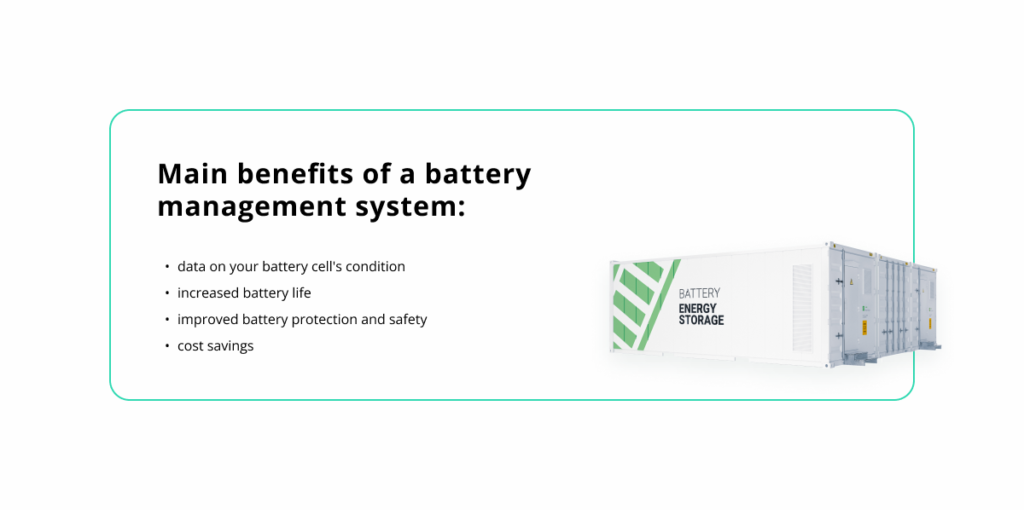
So what exactly can you gain by implementing a battery management system in your company? Here are just a few benefits:
Plenty of data about your battery cells’ condition
After adding the batteries to the management system, you won’t have to worry about checking the condition of each battery yourself anymore. Instead, the platform will monitor each battery condition 24/7 and show you the data gathered on the dashboard. From the exact amount of energy stored in every battery to each cell voltage, temperature, and capacity – everything will be visible at a glance.
By doing so, you can ensure that the battery is operating optimally and control the amount of energy stored inside it much more precisely.
Increased battery life
Using the information above, you can also quickly notice whenever the condition of your batteries starts to decrease or when one of them might need a technician check. For example, as the battery management system monitors cell voltages and temperature 24/7 and puts all collected data into the system’s dashboard, you will need just a glance to see that one of your batteries might be overheating or discharging too quickly.
By fixing those issues before they damage the cells, you can significantly increase the battery (or battery packages) lifespan.
A BMS can also provide you with data on the battery’s state over time which you can then use to schedule maintenance or predict when the battery might need to be replaced.
Improved battery protection and safety
In recent years, lithium-ion batteries have become the most popular type due to their lighter weight and greater storage capacity than lead-acid batteries. However, this type of battery is also known for being extremely sensitive to high temperatures or overcharging and also highly flammable.
If the lithium-ion battery pack malfunctions, then in the worst case, it can burst into flames, causing widespread damage to the battery systems and other electronic hardware used.
A BMS system has a couple of features built-in that can protect the lithium battery from overcharging, overheating, or short circuits though – and that way, prevent damage to the battery cell and reduce the risk of explosion.
Cost savings
Lastly, a BMS system can also help you save a good part of your budget. By having detailed information about each battery capacity and the amount of energy stored in each, you can make better decisions on how to make the best use of the energy.
24/7 battery status monitoring with automatic alerts in case of any malfunctions meanwhile will make the batteries last much longer and also help you prevent any equipment or infrastructure damage caused by failing batteries.
Plus, by optimizing their performance, you can also reduce the amount of energy lost during storage.
Heila EDGE – battery management system made by Codibly
As you can see, adding a battery management system to your main renewable energy plants and battery infrastructure could be a game-changer for your business. Besides gathering far more data than you could ever collect manually, you will also be able to ensure that your batteries are always working correctly and that any issues are fixed promptly.
Plus, the BMS will make it easier for you to grow and then manage the entire storage infrastructure – even when the battery modules are spread among several locations.
But while you can find a few ready-made battery management systems for the task, those might not have the specialized features you need to run, for example, your solar farm together with several batteries or batteries of different types.
In that case, it might be better to ask a development company specializing in renewable industry software to build a tailored BMS platform for you.
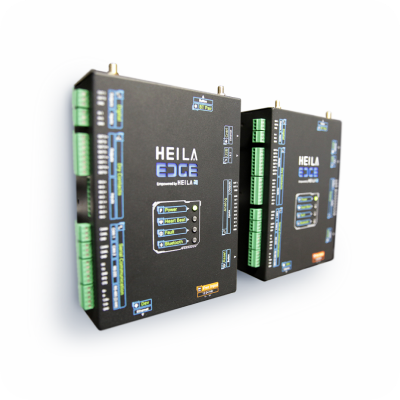
SOURCE: https://heilatech.com/heila-edge/
At Codibly, we have created quite a few tailor-made platforms for companies that wanted to manage their renewable energy plants or batteries. For example, one of the projects we worked on was creating the Heila Edge platform for managing and optimizing the performance of Distributed Energy Resources.
Heila Edge is a modular energy platform that allows businesses to connect, manage and optimize solar arrays, batteries, and other distributed energy resources. Using emergent intelligence, the platform can gather and process the data coming from the entire network, optimize the performance of each device, and alert the owners of any infrastructure issues.
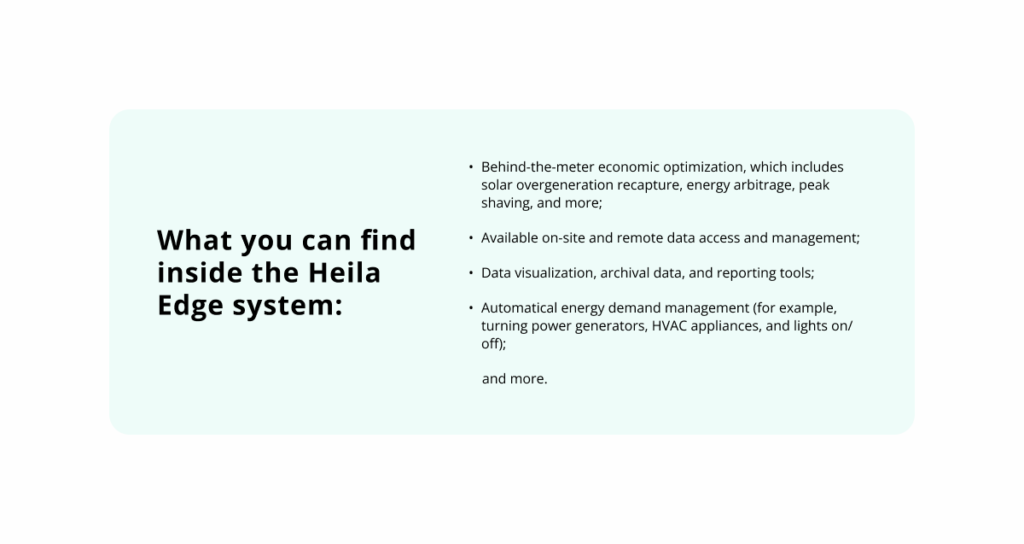
In the same way we helped Heila, we can also help your business. So feel free to send us your brief if you are thinking about building a battery management software solution but need a helping hand from experts.
Conclusion
Monitoring the condition of your batteries (especially lithium-ion ones) is essential if you want to ensure they will store renewable energy for years. But with how busy you probably are as a business owner, you surely don’t have enough time to keep an eye on them yourself.
Then, how about hiring battery management software for the task?
No matter how many batteries you have, you can add them to BMS, and then the platform will monitor their state, optimize their performance, and alert you of any issues that might negatively affect the battery life.
So that way, you can rest assured that your battery systems are working to their full power – and that you’ll have plenty of stored renewable energy available whenever you need it.
contact us
Need expert guidance on your next energy project?
Reach out to us and discover how Codibly can offer tailored solutions to drive your business.